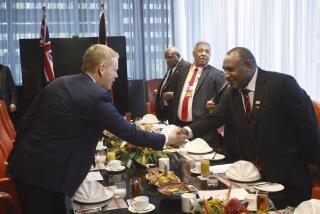Plutonium Pact With Japan Guts Proliferation Policy
In a striking departure from its newly adopted, conciliatory approach to Congress, the Reagan Administration has thrown down the gauntlet over an agreement with Japan governing plutonium use. In rejecting the advice of key leaders on Capitol Hill, the President has imperiled our most important tool in controlling nuclear proliferation.
The Administration maintains that the just-completed agreement, which is intended to replace the existing arrangement governing the use of U.S.-derived plutonium, fully complies with existing statutory requirements designed to ensure that any such use meets the most stringent non-proliferation standards.
Significantly, members of Congress who wrote those statutes disagree. An overwhelming majority of the Senate Foreign Relations Committee and 23 members of the House Foreign Affairs Committee have written the President, urging that the new agreement be withdrawn.
While nearly everything related to nuclear technology is exceedingly complicated, the basic issue here is fairly straight-forward: Using the pretext of a congressional directive to strengthen existing arrangements for the international sharing of plutonium, the Reagan Administration and the Japanese government have fashioned a new accord that actually sharply degrades the pre-eminent means of controlling the proliferation of plutonium used for weapons purposes--our right to approve on a case-by-case basis what others do with U.S.-provided plutonium.
Indeed, the new plutonium-sharing agreement both jettisons our present right to make case-by-case decisions on the use of our material and fails meaningfully to impose new safeguards mandated by the Congress. It should be no surprise, therefore, that the legislative branch is unhappy with this accord.
Unfortunately, this congressional reaction to a deficient agreement was as predictable as it is legitimate. Indeed, in April, 1987, Secretary of Defense Caspar Weinberger wrote the secretary of state expressing his view that the then-essentially agreed-upon accord did not comply with pertinent statutes. He urged in the strongest of terms that the negotiations be resumed so as, among other things, to restore our rights to determine that future Japanese use of U.S.-originated plutonium was consistent with sound non-proliferation practices.
While some aspects of the agreement were, in fact, renegotiated and improved following Weinberger’s intervention, our abandonment of the case-by-case review was not corrected. Accordingly, as the Defense Department’s representative in the final interagency review of this agreement before its endorsement by the President, I urged that it not be signed; I suggested instead that we continue to operate under the present, relatively satisfactory plutonium-sharing pact. This advice was not heeded. The resultant fiasco with Congress--an impasse that could so easily have been avoided--is consequently upon us.
The Administration is now faced with a painful choice. It can say “Damn the torpedoes, full steam ahead,” audaciously contending that the agreement does meet U.S. statutory requirements, even if those who enacted the laws in question do not concur. The Administration then runs the risk that the present confrontation with Congress will result in a formal repudiation of the new plutonium agreement.
Alternatively, the Administration can go back to the Japanese and undertake to fix the accord’s defects. Such an approach will be strongly resisted by those in the U.S. government responsible for its negotiation and by those reluctant to upset Japanese sensibilities. For their part, the Japanese will want no part of renegotiation; satisfied as they are with the wide latitude afforded them by the new agreement, we can count on Tokyo to announce that modifying this accord is unthinkable.
The obvious and sensible solution to this Gordian knot is for the President to quietly shelve the new accord. As the current agreement does not lapse until 2003, there is little danger of a complete interruption of U.S.-Japanese plutonium collaboration. But such collaboration that does take place will be performed under the existing, reasonably stringent controls. There need not be any loss of face for the Japanese involved; the President can always make Congress’ uncompromising attitude on nuclear proliferation the heavy.
It is tragic to think of the countless man-years spent pursuing a less-restrictive arrangement for plutonium-sharing with Japan that we will have to write off if this approach is followed. But it is a small price to pay compared to the tragedy that might ensue if our non-proliferation standards were to be eviscerated by this new accord and its inadequate, unsound arrangements.
More to Read
Sign up for Essential California
The most important California stories and recommendations in your inbox every morning.
You may occasionally receive promotional content from the Los Angeles Times.










